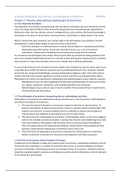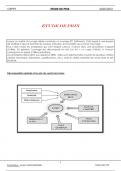Samenvatting
Philosophy of Economics. A contemporary introduction summary
- Instelling
- Erasmus Universiteit Rotterdam (EUR)
This is an English summary of the book Summary Philosophy of Economics. A contemporary introduction , written by a student of the Erasmus University. It's only 19 pages long and covers all the information of the 9 chapters that should be studied for this subject at Erasmus University Rotterdam.
[Meer zien]






